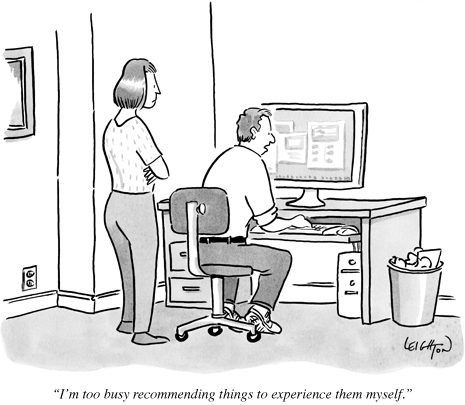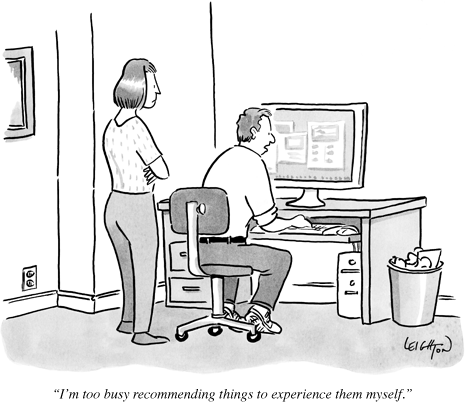“While the audience asked a ton of great questions, I was surprised by how many of both audience types approached me afterward to thank me for sharing (what I thought were) fairly basic mistakes that stand in the way of great product design.” Adhering to the basics and delivering a powerful solution is what differentiates an okay product from a great product.
Category: Uncategorized
The Danger of Recommendations
From Google tweaking its search algorithm or Netflix delivering to you the most relevant movies for your viewing pleasure, recommendations have become a core feature of technology companies today. Most welcome the opportunity to be pushed content they might be interested in based on their previous actions. News sites have recommended readings based on the article that’s currently being read. It provides convenience to the user and saves them time that would be spent looking for the same content manually.
Yes, there are benefits to a recommendation engine but when does recommendation become a problem? For example, Netflix has all my viewing habits for my life time as a subscriber. What if I want to develop new habits so I can gain access to new movies? Well yes, there’s the search function but outside of that, how do get access to those movies at the same ease that a traditional recommendation engine would present? Another example…..all my peers are talking about a topic on twitter and it becomes trending. How do I find the next idea or piece of content that might be trending?
Ultimately, the most undeserved experience for users today is the concept of discovery. Relevance breeds conformity and similar results. Discovery ties into a human experience that connects on a very deep level. Imagine how you felt when discovered a song you’ve never heard and loved it. What about finding a restaurant that has great food? Giving users the opportunity to explore and discover just like they do in the physical world is central to a balanced user experience.
The Fourth Pillar
Tony Elumelu published an article on Reuters on January 3, 2014 click here to read.
Mr. Elumelu discussed three critical components for a “Marshal Plan” for Africa.
- policy reform and a commitment to the rule of law
- investment in infrastructure
- commitment to developing Africa’s manufacturing and processing industries
While I definitely agree with his three pillars, I believe that there’s opportunity to integrate other facets of society in developing a holistic plan for Africa’s development. To get a better perspective, lets take a dive into the technical assistance portion of the actual Marshall Plan.
As part of the Marshall Plan, the United States appropriated funds for technical assistance to Europe. The United States sent hundreds of technical advisers to Europe and funded over 24,000 European engineers, politicians and business officials to visit the United States and learn best practices to implement in their respective countries. The institutional exchange of knowledge ensured that Europe could sustain accelerated growth.
In order to truly sustain and capitalize on an African “Marshall plan”, a fourth pillar focused on human capital should be added. We need to train and develop the continents young adults for 21st century jobs. While manufacturing and processing industries will continue to grow to sustain Africa’s consumer needs, its important to look past industries that will become heavily automated in the next 10-20 years.
So what form does human capital development take in the grand scheme? Well, a couple of ideas
- Education overhaul: Focus on STEM (science, technology, engineering, and math)
- Develop research centers (public-private partnership)
- Accelerating reverse brain drain
- Offering tax incentives for continuous workforce development
These are just a few examples that will help support the other three that Mr. Elumelu discussed. By adding human capacity building to the mix, you build on Africa’s most beneficial asset; its people.







